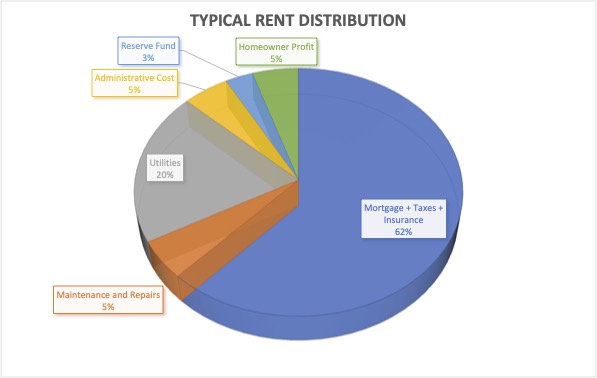Transparency Learning Series
Understanding Your Rent Payment
Commonly, there’s a prevailing misconception that rent payments result in substantial windfalls for landlords. However, the reality is quite different. The lion’s share of a tenant’s rent contributes to covering significant expenses like mortgage payments, property taxes, utilities, and maintenance. Landlords often operate on thin profit margins, as they need to ensure that the property remains in good condition, meets legal requirements, and ultimately provides a safe and comfortable living environment. It’s crucial for tenants to understand that the majority of their rent is allocated to these essential costs, dispelling the myth of landlords reaping enormous profits.
Where Does My Rent Go To?
The specific expenses covered by a landlord can vary based on factors such as the type of rental property, location, and local regulations. However, here are some common expenses and their average percentage allocation in many rental situations:
- Mortgage or Loan Payment: If the landlord has a mortgage or a loan on the property, a significant portion of the rent goes towards covering this expense. This can typically account for 25-35% of the rent.
- Property Taxes: Landlords are responsible for paying property taxes, which can vary by location. On average, property taxes can consume around 10-15% of the rent.
- Insurance: Landlords often have property insurance to protect against damage or liability claims. This expense typically represents 5-10% of the rent.
- Maintenance and Repairs: Routine maintenance and repairs are essential to keep the property in good condition. This can range from 5-15% of the rent, depending on the property’s age and condition..
- Mortgage or Loan Payment: If the landlord has a mortgage or a loan on the property, a significant portion of the rent goes towards covering this expense. This can typically account for 25-35% of the rent.
- Utilities: Some landlords include utilities like water, trash, or gas in the rent, while others pass these costs on to the tenant. If included, utilities may account for 5-15% of the rent..
- Property Management: If the landlord hires a property management company, a portion of the rent may go towards these services. Property management fees can range from 5-10%. Landlord Cart Properties, LLC provides services to landlords for a fee including the use of our property management platform.
- Administrative Costs: This can include expenses like advertising for new tenants, legal fees, and administrative overhead. Administrative costs are typically 3-5% of the rent.
- Reserve Fund: Landlords may set aside a portion of the rent for future large expenses or emergencies. This can vary but is often around 5%.
- Administrative Costs: This can include expenses like advertising for new tenants, legal fees, and administrative overhead. Administrative costs are typically 3-5% of the rent.
- Owners Profit: After all expenses are covered, the landlord takes a profit from the rent. The remaining amount is what the landlord retains.
Tenants Play a Key Role Too
Tenants can play a crucial role in controlling overall rental costs by practicing proper upkeep and being mindful of utility usage, which not only benefits the environment but also contributes to a more sustainable and cost-effective living arrangement.
Understanding the true breakdown of rent expenses can shed light on the fact that if a tenant were to own the property themselves, they would likely face many of the same or very similar costs. The expenses related to homeownership, such as mortgage payments, property taxes, utility bills, and maintenance, don’t disappear when one becomes a homeowner. In essence, this underscores why there often isn’t significant room for landlords to deeply discount rents. The funds collected from tenants are essential for maintaining the property and covering financial obligations, which would remain a reality for homeowners as well. Rent, in many ways, reflects the true costs associated with having a place to call home.
Contact Us
If you need to contact us, click Contact Us and we will get back to you at our highest priority.

